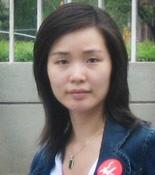Tang receives competitive York Fellowship

Tang receives competitive York Fellowship
- July 15, 2013
- Award supports research on Chinese politics
-----
 Beijie Tang, political science graduate student, is the recipient of a Herbert F.
York Global Security Dissertation Fellowship from the Institute on Global Conflict
and Cooperation. The award supports her research on interactions between domestic
politics and international behavior in China, an interest that stems from her lived
experiences
Beijie Tang, political science graduate student, is the recipient of a Herbert F.
York Global Security Dissertation Fellowship from the Institute on Global Conflict
and Cooperation. The award supports her research on interactions between domestic
politics and international behavior in China, an interest that stems from her lived
experiences
A Chinese native, Tang grew up in Shanghai before the end of the Chinese Cultural Revolution. She spent her adolescence and early adult life experiencing the growing pains of a changing nation under Deng Xiaoping’s Reform and Open-Door program. A member of the so-called “post-70s generation,” she participated in the Shanghai pro-Tiananmen mass protest in 1989. The experience led her to pursue a major in political science after she immigrated to the U.S. in 2004.
Tang earned her bachelor’s degree from the University of Nevada Las Vegas before beginning the political science doctoral program at UCI in 2008. She studies how leaders shape grand strategies that advance the interests of their ruling coalition and key constituents. She traces the development of elite politics and the institutional setting in which they operate, and the implications of shifting domestic preferences on economic development from the Mao era through the most recent Hu-Wen administration. She has been funded by the UCI Center for Asian Studies and Center for Global Peace and Conflict Studies. In 2012, she received the David Easton Award for Outstanding Graduate Student Qualifying Paper and the A. Kimball Romney Award for Outstanding Graduate Paper.
Below, Tang discusses why she came to UCI and implications of her research.
What drew you to UCI and the political science department in particular?
UCI boasts world-class researchers in my field and offers a collaborative and supporting
environment for graduate students. The multi-cultural campus and the clemency of Southern
California also add to the appeal.
What implications does your research have for society?
I am particularly interested in the trend of growing power of the state in China’s
economic affairs that occurred in the recent decade. China’s re-embracing of the state
vis-à-vis free market has immediate implications for the U.S.-China relations. America’s
business and security communities are in search of new approaches to constructively
engage a changing China. My dissertation is grounded in international relations theories
but heavily oriented toward effective policy making.
What are your plans after finishing your graduate degree?
I seek to contribute to constructive engagement between China and the U.S. by pursuing
a post-doctoral career where I could apply my academic interest to policy formulation
or public administration.
-----
Would you like to get more involved with the social sciences? Email us at communications@socsci.uci.edu to connect.
Share on:
Related News Items
- Careet RightNotes from a future professor
- Careet RightCan Opportunity Zones ever meet their poverty-fighting promise?
- Careet RightFei Yuan named one of ten global China Times Young Scholar Fellows
- Careet Right'Wired for Words: The Neural Architecture of Language,' an excerpt
- Careet RightEveryone's looking for a partner who has these 3 traits, according to research


